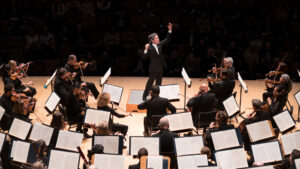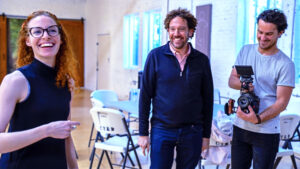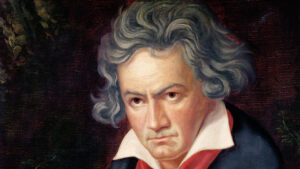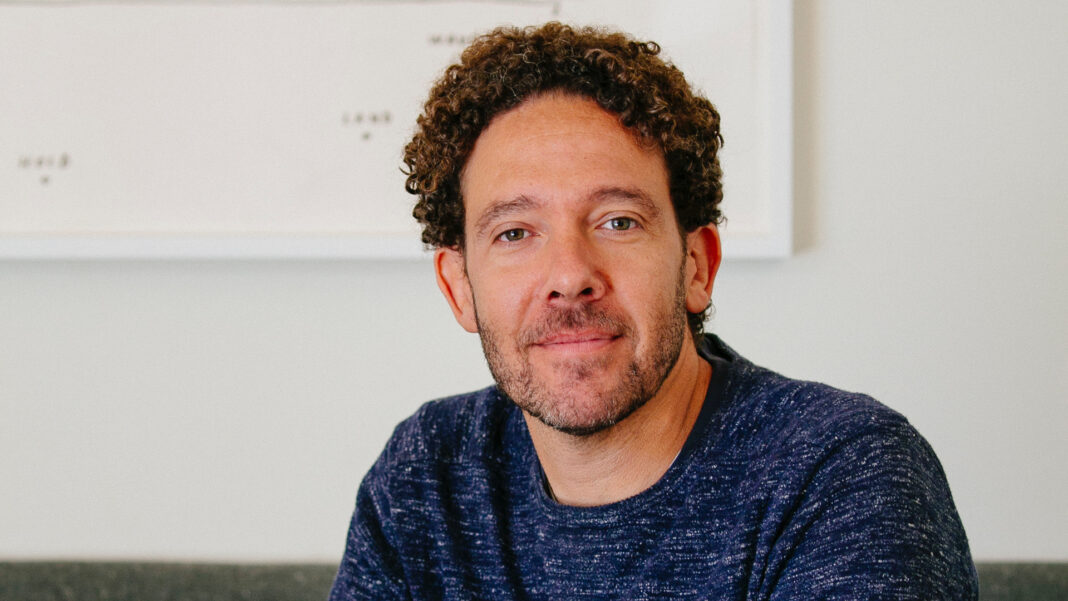The Academy Award-winning film Coda made it abundantly clear how challenging it is for deaf people to be part of our world and for hearing people to be part of theirs. The use of music was particularly powerful and for those who have seen the film you know how moving it was when the hearing and non-hearing were able to enjoy music together, albeit differently. It’s a subject that DJ Kurs knows very well.
Kurs, who was born deaf, has been the Artistic Director for ten years at Deaf West Theatre in Los Angeles. He’s currently collaborating with director Alberto Arvelo to bring together deaf actors with opera singers and the Los Angeles Philharmonic for three performances of Beethoven’s Fidelio. The concerts run April 14th – April 16th with Gustavo Dudamel leading the orchestra.
Putting deaf actors utilizing American Sign Language with singers isn’t new for Deaf West. Two musicals they produced made it to Broadway and both were nominated for the Tony Award for Best Revival of a Musical: 2004’s Big River and 2016’s Spring Awakening. But working in opera with one of the most prestigious orchestras in the world is something else as I learned when I spoke with him (with the help of an ASL interpreter) last week.
What follows are excerpts from that conversation that have been edited for length and clarity.
What was your first response when you were told Gustavo Dudamel and the LA Phil wanted to partner with Deaf West Theatre for a concert production of Beethoven’s Fidelio?

At first I said no. We have said no to a lot of possible opera opportunities over the past couple of years. The pandemic gave us an opportunity to really explore everything and I started consider why am I saying no to pieces like this? The pandemic gave us strength. It gave us some perspective; just some time to step back a little bit and see what could be possible and to see where this opportunity could lead.
I feel like this could be the beginning of a journey. With not only deaf performers, but also introducing opera, that whole art form that for so long has been accessible to inaccessible to our community and inaccessible to our language.
I’m also excited by the idea of making the Disney Hall access accessible to the deaf audience as well. I think this is the last major hall in L.A. that I will have sat in and been able to see a show. That’s exciting to me. I feel like in some way we are winning some sort of battle just by putting sign language on stage in that type of hall.
As we saw in Coda the combination of sign language and music can elevate each other. Why is that combination so potent for hearing and non-hearing audiences?
I always felt that all musicals should include sign language. I feel like sign language in itself really helps music in the same way that choreography helps us to understand music. I also think that sign language allows us to wear our emotions on our sleeves. We know that people think of the hands when they think of sign language, but the most important feature is our face and our facial expressions and the body language that is being showed. 80 percent of sign language is what we communicate with our eyes.
How is working with opera different for you and your cast than doing musicals?

We’ve designed a process so that once the actors go into musical theater, go into the production, go into rehearsals, that it’s fluid. We give them cues. We give them signposts. We give them moments where even if you know it’s a tough moment we will still provide context of building to make sure that the actors support it. We learned that every song in the opera is going to be different every night based on the room, based on Gustavo and his thought process in that moment. So I started to think, how are we going to design this process that the deaf actors are not at battle with the conductor?
For many of us deaf people we are relying on muscle memory. We will rely on rehearsal and knowing the beats. And in opera there’s no bass tones that we could use to then cue us to where we are. And that’s what is a challenge for us and that is a journey that we are figuring out as we go.
We thought that we would be able to feel the music more because it is a wood floor. But because of everything being so orchestral we don’t feel as much of the bass. We’re in rehearsals right now and we are in the thick of it. We are navigating the blood, sweat and tears to make sure that people are doing it over and over again, practicing the songs. We’re trying to make sure that they are getting ready to be in harmony with the conductor and the rhythm of opera.
How does Fidelio resonate with you and your cast?
It’s talking about freedom. The theme of longing for freedom and justice, and that striving for a better future for people to just do better. And it’s that epic theme that really resonates and allows us as audience members to see and also relate to the music and the journey of the character in that time frame. Fidelio was written by Beethoven and he wrote the whole thing from his own memory of music. He would never hear the melody, but it was playing in his head. So when I watch the actors in rehearsal I feel that melody myself and it’s a special experience.
Earlier you mentioned how this production will invite deaf people into the world of opera. What is the opportunity for hearing audiences to be invited in the world of deaf people with this production?

I think after seeing this production they won’t want to go back to a typical production. Maybe this is a big announcement from me, but I feel like this is really something that is going to lead to more opera in the future; more signed opera for myself.
I always assumed that opera was a world in a space that I shouldn’t go into, which I shouldn’t even bother. Because it has now opened the door to us, we are able to step in and we are able to play and explore and I really value these types of opportunities.
I think for hearing audience members they will connect with our actors and their expressiveness and their eyes. And hopefully that is going to enhance the experience of music for them.
Artist David Hockney, who has been battling hearing loss for several years once said, “I actually think the deafness makes you see clearer. If you can’t hear, you somehow see.” Is he correct and what has this project allowed you to see?
As a deaf person I know that I see things differently. And I know that there are scientific facts that deaf people do have better peripherals and that I do see more along the margins than other people don’t see. But I also think that deaf people see more about each person.
Maybe for David, who is losing his hearing, his sight or his vision is widening. But I was deaf from birth and we’re constantly looking for entry points into music. And so the journey is a little bit different between the two of us, but we are reaching the same conclusion. And it’s that music can be expressed through humanity and in the moment of that character and their expression.
Main photo: DJ Kurs (Photo by Tate Tullier/Courtesy Deaf West Theatre)










